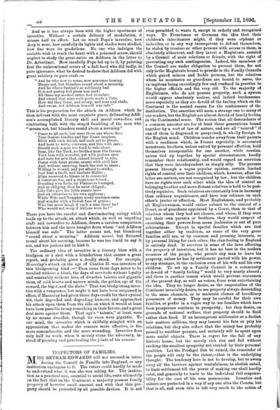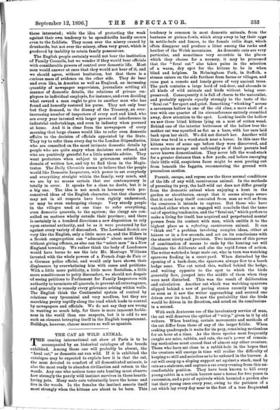INSPECTORS OF FAMILIES.
MISS BETHAM-EDWARDS will not succeed in intro- ducing the Conseil de Famille into England, or any institution analogous to it. The voters could hardly be made to understand what it was she was asking for. The institu- tion as a practical one, essential to social life, rests ultimately on the fact that on the Continent a majority possess family property of however small amount, and wish that this pro- perty should be protected by all possible devices. It is not even permitted to waste it, except in orderly and recognised ways. To Frenchmen or Germane the idea that their children's inheritances might, if they were orphans or imbeciles, or in any way incompetent to defend themselves, be stolen by trustees or other persons with access to them, is absolutely abhorrent, and they invest a Magistrate. assisted by a Council of male relations or friends, with the right of preventing any such contingencies. Indeed, the members of the Council are under obligation to prevent them, for not only is the Magistrate bound to preside in the Family Councils which guard minors and feeble persons, but• the relatives whom he nominates as guardians are bound to serve, the ex 2mptions being exceedingly few and confined in practice to the higher officials and the very old. To the majority of Englishmen, who do not possess property, such a system would appear absolutely useless, and indeed burdensome, more especially as they are devoid of the feeling which on the Continent is the second reason for the continuance of the institution. The assertion will seem a strange one to many of our readers, but the English are almost devoid of family feeling in the Continental sense. The notion that all descendants of a common ancestor are for at least three generations bound together by a sort of law of nature, and are all " tainted " if one of them is disgraced or pauperised, is wholly foreign, to the English mind. Children wander away from their parents with a readiness which, in France especially, is accounted monstrous, brothers, unless united by personal affection, hold themselves irresponsible for one another, while cousins, unless tied up together by special circumstances, hardly remember their relationship, and would regard an assertion that they were interdependent as simply silly. The parents possess through a vague popular opinion, certain limited rights of control over their children, which, however, after the latter are sixteen, are not recognised by law , but the children have no rights over each other while the idea of control as belonging to other and more distant relatives is held to be posi- tively repulsive. Such relatives are constantly less in harmony than ordinary acquaintance, and have less reliance on each other's justice or affection. Most Englishmen, and probably all Englishwomen, would rather submit to the control of a Court, or of guardians appointed by a Court, than to that of relatives whom they had not chosen, and whom, if they were not their own parents or brothers, they would suspect of exercising their powers from mean jealousies or out of pure arbitrariness. Except in special families which are tied together either by tradition, as some of the very great families still are, or by common and pressing interests, or by personal liking for each other, the clan-feeling in England is entirely dead. It survives in some of the laws affecting the property of intestates, but it has no base in the modern manners of the people, who permit any man to leave his property, unless he has by settlement parted with his power, to any stranger, to the exclusion even of his wife and his own children. To set up a Family Council in a community so devoid of " family feeling " would be very nearly absurd ; and there is another reason which would prevent statesmen of the present day, as well as voters, from even entertaining the idea. They no longer desire, as the respectables of the Continent invariably desire, to see property always descending in the same channels, or to maintain classes of hereditary possessors of money. They may be careful for their own families, or prefer in a vague way to see families which have been prosperous continue in prosperity ; but they desire, on grounds of national welfare, that property should be fluid rather than fixed. If an incompetent millionaire or a foolish heir scatters millions, they may lament his fate or pity his relations, but they also reflect that the money has probably passed to worthier persons, and certainly will be spent upon more useful objects. There is regret for the fall of any historic house, but the merely rich rise and fall without exciting the smallest sympathy not created by their personal qualities. Let the Prodigal Son be ruined, the remainder of the people will only be the richer,—that is the underlying thought. The tendency here is not to develop, but to sweep away all the barriers against wastefulness, to abolish entail, to limit settlement till the power of making one shall hardly exist, and generally to leave to the individual full responsi- bility for the care of his own possessions. Lunatics and minors are protected in a way if any one stirs the Courts, but that is all, and even this is left very much to the action of
those interested ; while the idea of protecting the weak against their own tendency to be spendthrifts hardly occurs even to the faddists. They moan over the misery caused by drunkards, but not over the misery, often very great, which is produced by inability to retain family possessions.
The English people certainly would not bear the institution of Family Councils, but we wonder if they would bear officials with considerable powers of control over domestic life. Most men would answer at once that they would not hear of it, and we should agree, without hesitation, but that there is a curious mass of evidence on the other side. They do bear and even like, in America as well as England, an increasing -quantity of newspaper supervision, journalists settling all manner of domestic details, the relations of private em- ployers to individual employes, for instance, and even deciding what reward a man ought to give to another man who has found and honestly restored his purse. They not only bear ;but they demand, to the dismay of the Treasury, an ever- increasing number of inspectors of every sort and kind, who are every year invested with larger powers of interference in industrial undertakings, and even in industry when pursued at home. And it is clear from the newspapers of every morning that large classes would like to refer even domestic affairs to the decision of officials appointed by the State. They try to refer them every day to the London Stipendiaries, who are consulted on the most intimate domestic details by people who are quite angry when decisions are refused, and who are positively grateful for a little sensible advice. They want protectors when subject to grievances outside the domain of written law, and try to find them in the Magis- trates. The Daily Chronicle seems to believe that the people would like Domestic Inspectors, with power to set everybody and everything straight within the family, very much, and we are by no means certain that our contemporary is totally in error. It speaks for a class no doubt, but it is a big one. The idea is not much in harmony with pre- conceived ideas of the English character, but that character may not in all respects have been rightly understood, or may be even undergoing change. Very sturdy people in the villages used at one time to refer everything, even domestic quarrels, to the squires; the clergy are con- sulted on matters wholly outside their province ; and there is certainly in a hundred directions a new disposition to rely upon external authority, and be as it were protected by fiat against every variety of discomfort. The Lowland Scotch are very like the English, only a little more so, and the Elders in a Scotch congregation can " admonish " about most things without giving offence, as also can the " select men " in a New England township. We rather think the body of Londoners would have borne to see the late Mr. Montagu Williams invested with the whole powers of a French Juge de Paix or a 'German police official, and would only have shown their displeasure by overwhelming him with cases and petitions. With a little more publicity, a little more Socialism, a little more sensitiveness to petty discomfort, we should not despair of seeing petitions to Parliament for Family Inspectors with authority to terminate all quarrels, to prevent all extravagance, and generally to remedy every grievance arising within walls. The English think the Continental system of control by relations very tyrannical and very needless, but they are marching pretty rapidly along the road which leads to control by newspapers and officials. We do not say they are wrong in wanting so much help, for there is more innocent feeble. ness in the world than one suspects, but it is odd to see such an element betraying itself in the English temperament. Bulldogs, however, choose masters as well as spaniels.



































 Previous page
Previous page